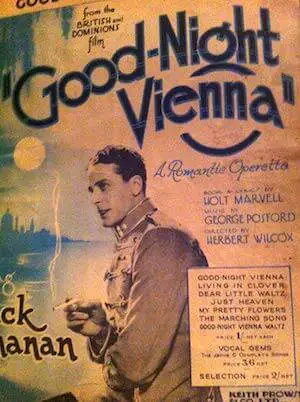‘Goodnight Vienna’ means ‘it’s all over’, for example “Jack stepped on the landmine and it was goodnight Vienna”. It is also used to refer to an implied coming conclusion which has become inevitable, for example “She winked and beckoned me towards her bedroom and I knew it was goodnight Vienna”.
Goodnight Vienna
What's the meaning of the phrase 'Goodnight Vienna'?
What's the origin of the phrase 'Goodnight Vienna'?
The phrase ‘Good-night Vienna’ is most commonly used in the UK and is first found in print as the title of a 1932 radio operetta written by Eric Maschwitz, which was later made into a film of the same name starring Jack Buchanan and Anna Neagle. However, there’s no reason to see this as the source of the expression as it is now used, with the meaning ‘it’s all over’ – the film’s use of the two words is merely a coincidence deriving from the storyline of two lovers who say farewell in Vienna.
For the origin we need to move forward to the 1960s. The film was well-known and it’s title was put to use by a journalist on the UK newspaper The Coventry Standard in April 1965, in a story about a woman gymnast called Maureen Wallis. Wallis was due to be part of a group of gymnasts to travel to take part in a display in Vienna but twisted her ankle at the last minute. The paper reported this with:
It is “Goodnight Vienna” for the dark-haired senior champion.
That is the first use that I can find of the phrase in its metaphorical sense, that is with the meaning ‘it’s all over’, although it is quite possible that the journalist was making use of an expression that was already street slang.
Ringo Starr used ‘Goodnight Vienna’ as the name of an album that he released in 1974. The title track was written by John Lennon. The lyrics of the song are ambiguous but they do seem to refer to the ‘the inevitable happened’ meaning of the phrase. Again, Lennon didn’t coin the phrase but its use as an album and song title brought it to a much wider audience.
By the 1980s the phrase was in common use, as its inclusion without any explanation in the script of the popular BBC comedy series Only Fools & Horses in 1989 shows:
If she was to see you in that dopey shirt and yer face covered in Randolph Scotts! Well, it’d been goodnight Vienna, wouldn’t it.
[Note: Randolph Scotts is Cockney Rhyming Slang for spots.]
That’s the history of the phrase but how did it come to be coined? The ‘goodnight’ part seems intuitive and an allusion to ‘things are finished’, ‘the lights are off’, ‘Elvis has left the building‘, but why Vienna? Well, it seems (unless the Coventry Standard piece really did originate the phrase) that there is no compelling reason – it could just as well have been ‘goodnight Berlin’ or ‘goodnight Miss Piggy”. The reason for thinking this is that there have been many ‘goodnight [random noun]’ phrases dating back as far as Middle English variants from the 16th century. These include:
Goodnight John Line (Thomas Whythorne, 1576)
Goodnight Landlady, the moon is up. (John Day and Henry Chettle, 1640)
Goodnight Nicholas, the moon is on the flock bed. (James Howell, 1659)
Goodnight nurse (Marvin Dana, 1913)
Goodnight Joe Doyle (Brendan Behan, 1956)
Goodnight Irene (Boyd and Hayle, 1973)
Vienna is now established as the noun of choice from this long and somewhat arbitrary list.
People often write to me to say that they have coined a new phrase and how do they register it. That’s always seemed to me to be a bizarre ambition but, given the success various authors have had in the past, anyone wanting to claim the coinage of a new expression might do worse than “goodnight [some new random noun]”.
[PS “goodnight Miss Piggy” is already taken.]
The history of “Goodnight Vienna” in printed materials
Trend of goodnight vienna in printed material over time
Browse more Phrases
About the Author

Phrases & Meanings
A-Z
A B C D E F G H I J K L M N O P Q R S T UV W XYZ
Categories
American Animals Australian Bible Body Colour Conflict Death Devil Dogs Emotions Euphemism Family Fashion Food French Horses ‘Jack’ Luck Money Military Music Names Nature Nautical Numbers Politics Religion Shakespeare Stupidity Entertainment Weather Women Work
How did we do?
Have you spotted something that needs updated on this page? We review all feedback we receive to ensure that we provide the most accurate and up to date information on phrases.
